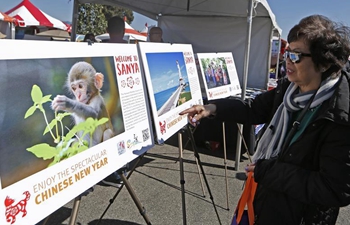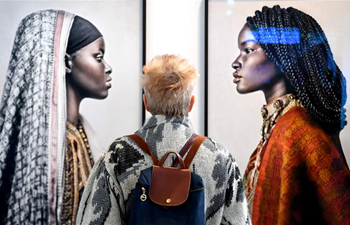SAN FRANCISCO, Feb. 21 (Xinhua) -- An exhibition on the art of late Chinese Ming Dynasty, which opened Tuesday evening at U.S. University of California Berkeley (UC Berkeley), mirrored the strong desire of a group of UC Berkeley students for deeper understanding of Chinese culture.
The art exhibition, titled Dreaming the Lost Ming, is a joint work of the UC Berkeley students who share the same love for Chinese cultural heritage and are working on a seminar program given by Professor Sophie Volpp on the painting and theater of the 17th-century Ming Dynasty in China.
The exhibition features fan paintings and landscape paintings by Ming Dynasty artists, including Fan Qi (1616-1694), the second most accomplished painter among the "Eight Masters of Jinling (ancient name of Nanjing in modem China)."
The exhibits, selected from permanent collections of UC Berkeley, capture the ephemeral world portrayed in the play The Peach Blossom Fan (1699), which narrates a tragic love story.
Senior Curator for Asian Art Julia White, who is organizing the exhibition, said all the students on Volpp's art program, including undergraduates and graduates, came from the background of Chinese language and literature, but only two of them actually have a background in art history.
"So they managed to narrow the knowledge and understanding of Chinese art history," said White, who once studied at Beijing University of China and has been committed to the research of Chinese art and literature for over 30 years.
She said the exhibition, which was held during the period of the Chinese Lunar New Year of the Dog that began on Feb. 16, underlines the strong desire for more profound exploration of Chinese art and cultural heritage by the group of the UC Berkeley students who come from both Chinese and American families.
Melissa Van Wyk, who is studying for a Doctoral degree on Japanese theater, said she has done a lot of research on the artwork of Japan, but still wants to learn more about Chinese art.
"Both Japan and China have their own drama, but I'm really interested in the theatricality of artwork, their own drama," she said.
"I found a lot of interesting connections between the drama of Japan and China," she added.
Shirley Shao, who was born in China and brought up in America, said she loves Chinese culture and art.
"I was brought here when I was two years old, but I really had great interest in Chinese art and literature," she said.
"Although I worked on double major in Biology and Chinese, I still chose to select the alternative program on Chinese art, just because I love it," Shao said.
A female post-doctoral fellow on the research of Ming and Qing dynasties, who only chose to be identified as Fan, said she graduated last year as a Ph.D student from the Chinese Classics Research Institute of Fudan University in Shanghai in southern China.
"I came here to continue my research on the Ming and Qing dynasties because I think I can benefit a lot academically from a different perspective," she said.
She noted that the study on the Ming-Qing Dynasty will inevitably touch on the history of art, "and that's why I select this course and be part of this exhibition."
" You know, UC Berkeley has abundant resources of art and literature, and the exhibits on display here are a good example, which is not easy to get access to under normal circumstances," she said.
"As you know, we often saw the exhibits like these normally on display in museums or art galleries, instead of in universities or on campus," she said.













